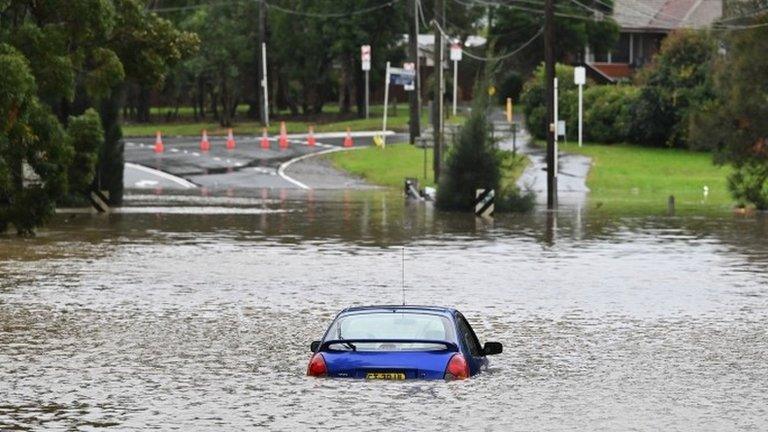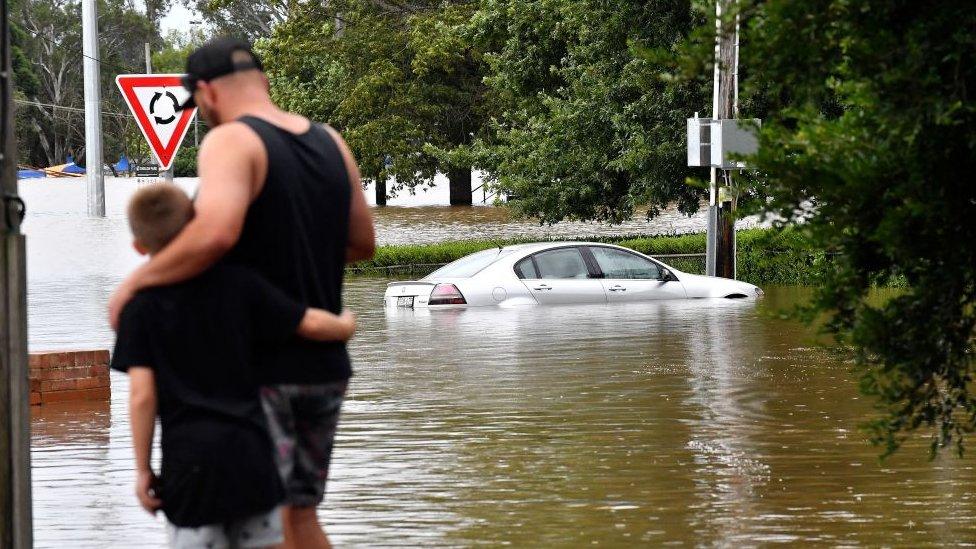Sydney floods: Tens of thousands told to evacuate
- Published
Watch: Sydney flash floods turn roads into rivers
A man has died and thousands of people have been told to evacuate their homes amid torrential rain and major flooding in Australia's largest city, Sydney.
Roads have been cut off, with 18 evacuation orders in western Sydney alone and warnings of more to come.
"This is a life-threatening emergency situation," Stephanie Cooke, emergency services minister for the state of New South Wales, said.
Australia was hit by major flooding in March, killing 20 people, many in NSW.
"We are now facing dangers on multiple fronts - flash flooding, riverine flooding and coastal erosion," Ms Cooke told a media briefing.
Her warning came as the Bureau of Meteorology said up to 350mm of rain had hit certain areas, risking flooding along the Nepean river.
Sydney's main dam had also started to spill overnight - a further concern for the authorities.
Ms Cooke said this was a "rapidly evolving situation" and warned that people should be "prepared to evacuate at short notice".

There had been 83 flood rescues by emergency services in the past 24 hours alone, she said.
"It unfortunately shows that people aren't necessarily heeding the advice that we continue to put out multiple times a day in relation to this flooding event," Ms Cooke said.
"I'm respectfully asking people to avoid non-essential travel at this time."
Her warnings come as an unnamed man was killed after falling out of a kayak on the Parramatta River in western Sydney. Emergency officials attempted to revive the man after he was spotted struggling in the water by a member of the public, but he died at the scene.
Experts say the flooding emergency has been worsened by climate change and a La Niña weather phenomenon. A La Niña develops when strong winds blow the warm surface waters of the Pacific away from South America and towards Indonesia. In their place, colder waters come up to the surface.
In Australia, a La Niña increases the likelihood of rain, cyclones and cooler daytime temperatures.

Have you been affected by the floods? If it is safe for you to do so, please share your experiences by emailing: haveyoursay@bbc.co.uk, external.
Please include a contact number if you are willing to speak to a BBC journalist. You can also get in touch in the following ways:
WhatsApp: +44 7756 165803
Tweet: @BBC_HaveYourSay, external
Please read our terms & conditions and privacy policy
If you are reading this page and can't see the form you will need to visit the mobile version of the BBC website to submit your question or comment or you can email us at HaveYourSay@bbc.co.uk, external. Please include your name, age and location with any submission.
Related topics
- Published8 March 2022
